BWW Preview: Ready or Not, Here Comes NY's PROTOTYPE 2019, January 5-13
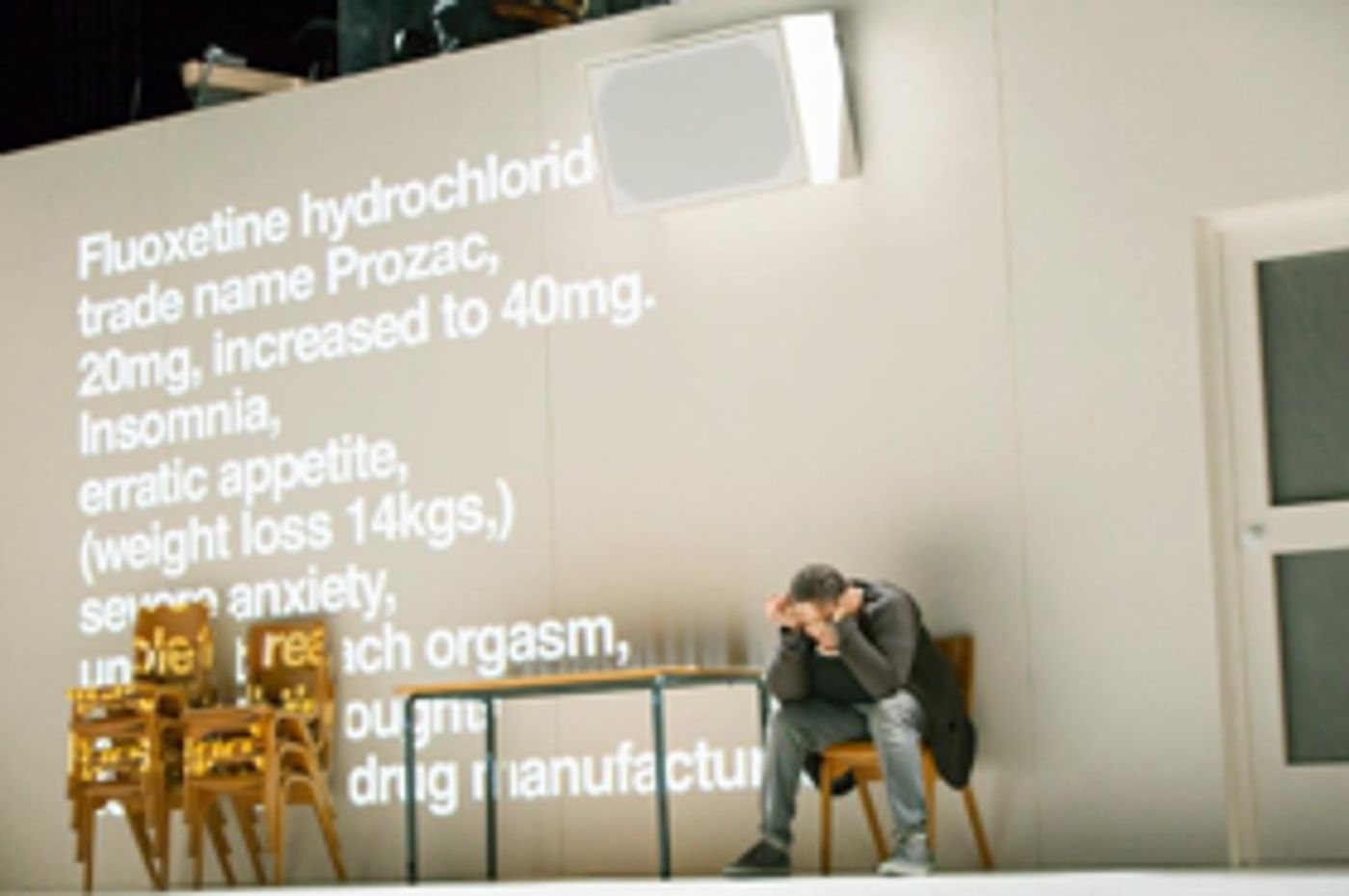
Photo: Stephen Cummiskey/ROH
New York's PROTOTYPE Opera/Theatre/Now Festival returns for its seventh season from January 5 to the 13th and the one thing that you can't ask about it is "What's new?" That's not because there's nothing to answer.
On the contrary--there's too much, in composer/librettists, in style, in content, in the sizes of its venues, according to the two producers I spoke with, Kristin Marting of HERE and Beth Morrison of Beth Morrison Productions (BMP). (The other two are Kim Whitener of HERE and Jecca Barry of BMP, whom I interviewed before the 2018 festival.)
"This year's Festival is larger than ever," says Marting. "In the past, we've had seven or eight events; this time, there's a dozen works, 24 composer/librettists and over 150 collaborators. We're continuing to investigate the line between music-theatre and opera and are really interested in audiences experiencing a range of work and having conversations about why something's opera, why it's simply music--or if you can't tell anymore what something is, because it crosses so many lines," Marting explains, noting that they received a grant from the Andrew W. Mellon Foundation to hire, for the first time, two full-time employees just for the festival.
"How do you put a festival like this together?" I asked the two women.
HERE and BMP are both producing organizations, working on a variety of projects many years out, and some of the components of PROTOTYPE come from their own works in process. Morrison says that they then fill in with things they've seen and want to present--they all travel extensively, both nationally and internationally, looking for the most interesting developments in music theatre/opera/you-name-it that might add richness to the rundown of projects being showcased.
PRISM and 4.48 PSYCHOSIS
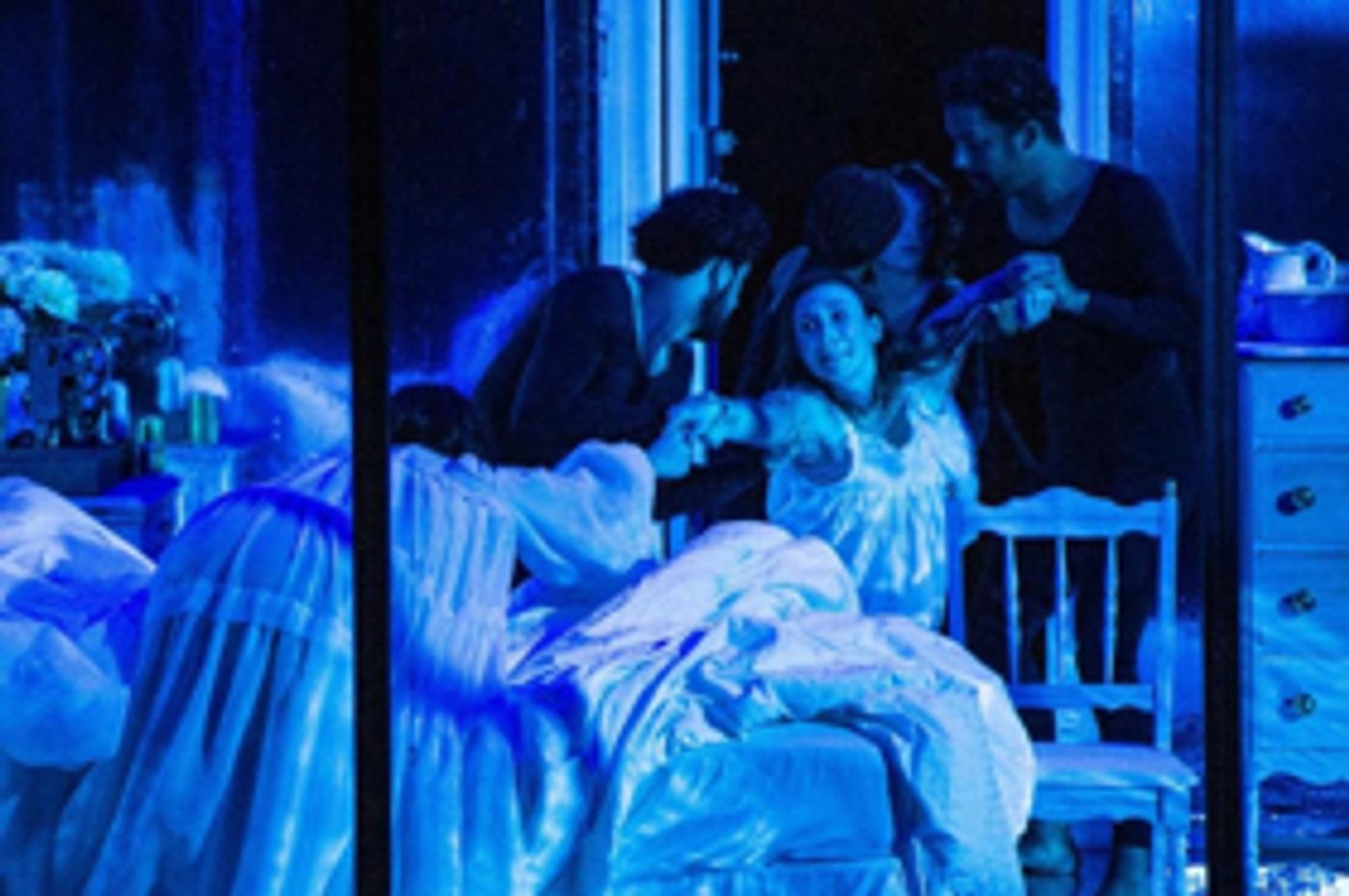
Photo: Noah Stern Weber
The centerpieces of this year's PROTOTYPE are Ellen Reid's PRISM, with libretto by Roxie Perkins, directed by James Darrah, which premiered to a rapturous reception in Los Angeles at the end of November and 4.48 PSYCHOSIS, John Venables' opera based on a play by Sarah Kane, which debuted in in 2016 at London's Royal Opera's off-Covent Garden site at the Lyric Hammersmith, directed by Ted Huffman.
PRISM has been described as "a haunting, kaleidoscopic new work of opera-theatre that traverses the elasticity of memory after trauma." It has been a pet project of Morrison during its five years of development with director Darrah; while it predates the #metoo movement, it couldn't be more current if it were written on the spot. "PRISM is definitely the one that has been programmed the longest" and composer Reid has conjured lots of excitement since the piece's premiere.
Julian Wachner conducts performances of the chamber opera, which will take place at La Mama on East 4th Street and include the Trinity choir. "It's is an excellent example of the eclectic vocabulary used in music being written today," says Morrison. "Act I builds a fantasy world that lives in a French impressionist style; Act II is in a club, with electronic drums. There's a sort of Gregorian chant piece and, of course, Reid's own contemporary music style."
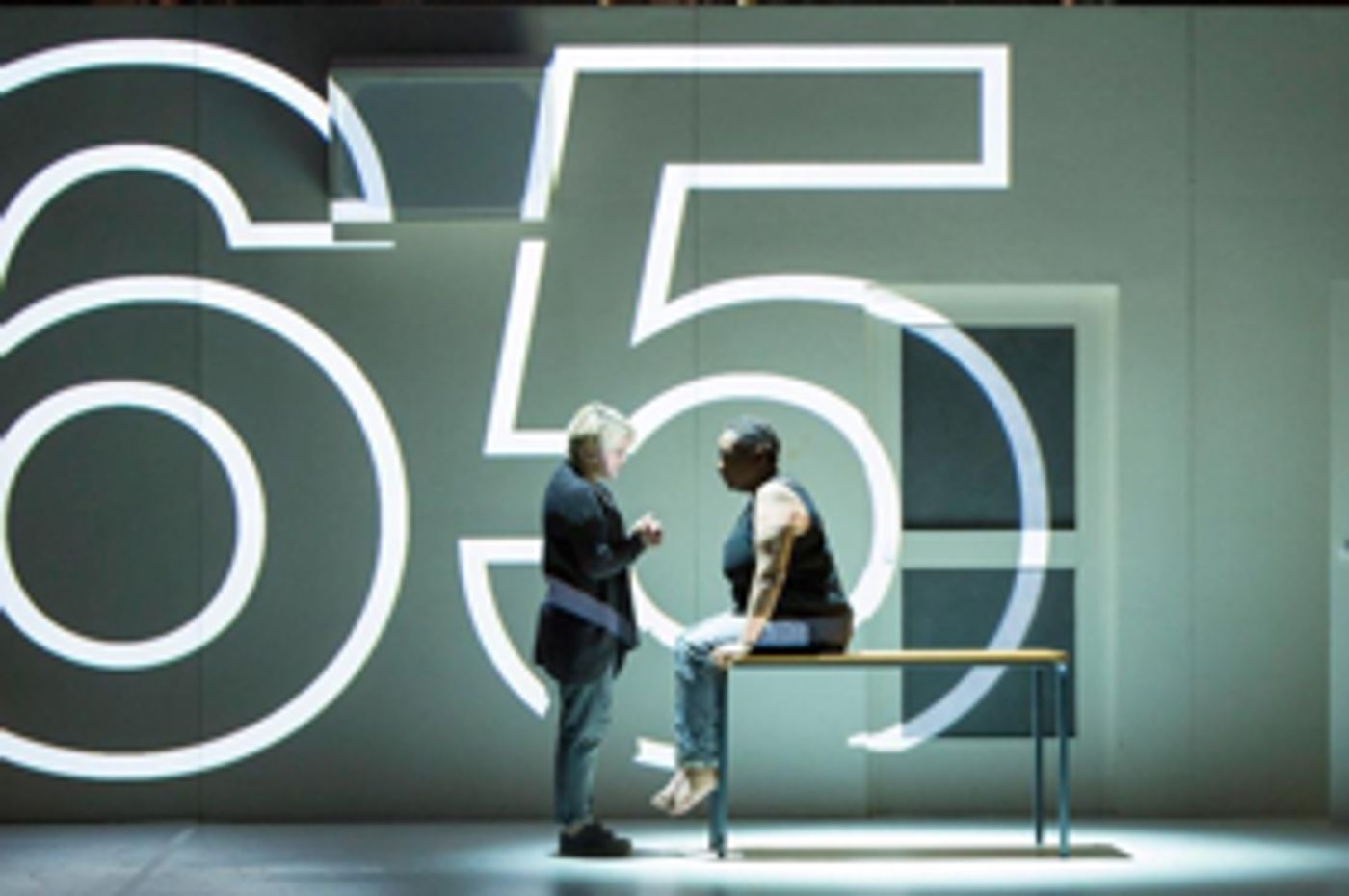
4.48 PSYCHOSIS. Photo: Stephen Cummiskey/ROH
While Marting calls 4.48 PSYCHOSIS "the most opera-y of the works at this year's festival," and it's the production seen from the Royal Opera, the scale is different: The theatre seats about 200, less than half of its London counterpart, at the Baruch Performing Arts Center in Manhattan on east 25th Street.
It's based on the final play of Sarah Kane--an acclaimed playwright who committed suicide and found her greatest recognition after her death--detailing the experience of clinical depression and revealing an individual's struggle to come to terms with their own psychosis.
"When she was alive, her work was generally done in small theatres, so we thought it would be an interesting choice to see the opera"--which consists of 24 fragmented episodes--"in an intimate context like the ones she was used to," Marting explains.
Many considerations go into choosing the rundown of events. There is some work that is programmed several years out. For example, the producers were very keen on both the centerpieces but were waiting for the right moment to present them: PRISM for the right time in its development ("it was supposed to be in last year's festival but it wasn't quite ready," says Morrison) and PSYCHOSIS for the funding of the import to come together.
Then it was a matter of providing a balance--the spectrum of writers being featured, the spectrum of composers, the subject matter, the mix of men vs. women and race. Then there's a discussion of themes--or are there any? "We do try to balance 'opera opera' with music-theatre," says Morrison "Vocal theatre is what we're starting to call things now, because it's a term that keeps the mind open better than calling something music-theatre or opera."
There are, of course, budgetary and resource constraints, so the producer are watching out for works in a variety of scales. But it's not just money that makes the PROTOTYPE world go 'round: Says Morrison, "We are always looking to present a variety of scales because it's important for us to be showcasing what's out there--and what's 'out there' is a huge variety. We're always trying to pick the best of what's in music-theatre and opera--and trying to source the best possible artists to put on display."
TRAIN WITH NO MIDNIGHT and PARTITA FOR 8 VOICES
What kind of range are they talking about? At one end, there's TRAIN WITH NO MIDNIGHT, the intimate piece by Joseph Keckler that's being done in the 65-seat Dorothy B. Williams Theatre downstairs at HERE; at the other, there's Caroline Shaw's PARTITA FOR 8 VOICES, which is being done in Times Square, between West 43 and 44 Street, and could have an audience of, say, 11,000 walking by during its 25-minutes, according to Marting.
Keckler's TRAIN WITH NO MIDNIGHT has been described as an "intimate musical ensemble lead the audience through a series of vignettes, each like a stop on a late night train." The text by the witty composer-singer-storyteller-cabaret artist "dances between comedy, commentary and communion," while the score features smoky pop songs, propulsive invocations, and leaps into the operatic realm.
PARTITA--a Pulitzer Prize winner in 2013--is part of PROTOTYPE's Out of Bounds series, which brings free, site-specific work to public spaces is curated in its third season by Raul Zbengheci. And this is the first time that PARTITA, an environmental choral work, is being staged and choreographed in this form, amplified, and performed by Roomful of Teeth, the Grammy award-winning vocal ensemble of which Shaw is a member.
According to the Pulitzer committee, the work draws stylistically from square dance calls, the American folk hymn, "Shining Shore," and the guided wall drawings of artist Sol LeWitt, "uniquely embracing speech, whispers, sighs, murmurs, wordless melodies and novel vocal effects." PROTOTYPE is partnering with Times Square Arts. (Partnering is key ingredient in the financing of the 10-day Festival both producers agreed.)
PANCHO VILLA and THE INFINITE HOTEL
Two of the pieces on the program had Kickstarter Performance funding.
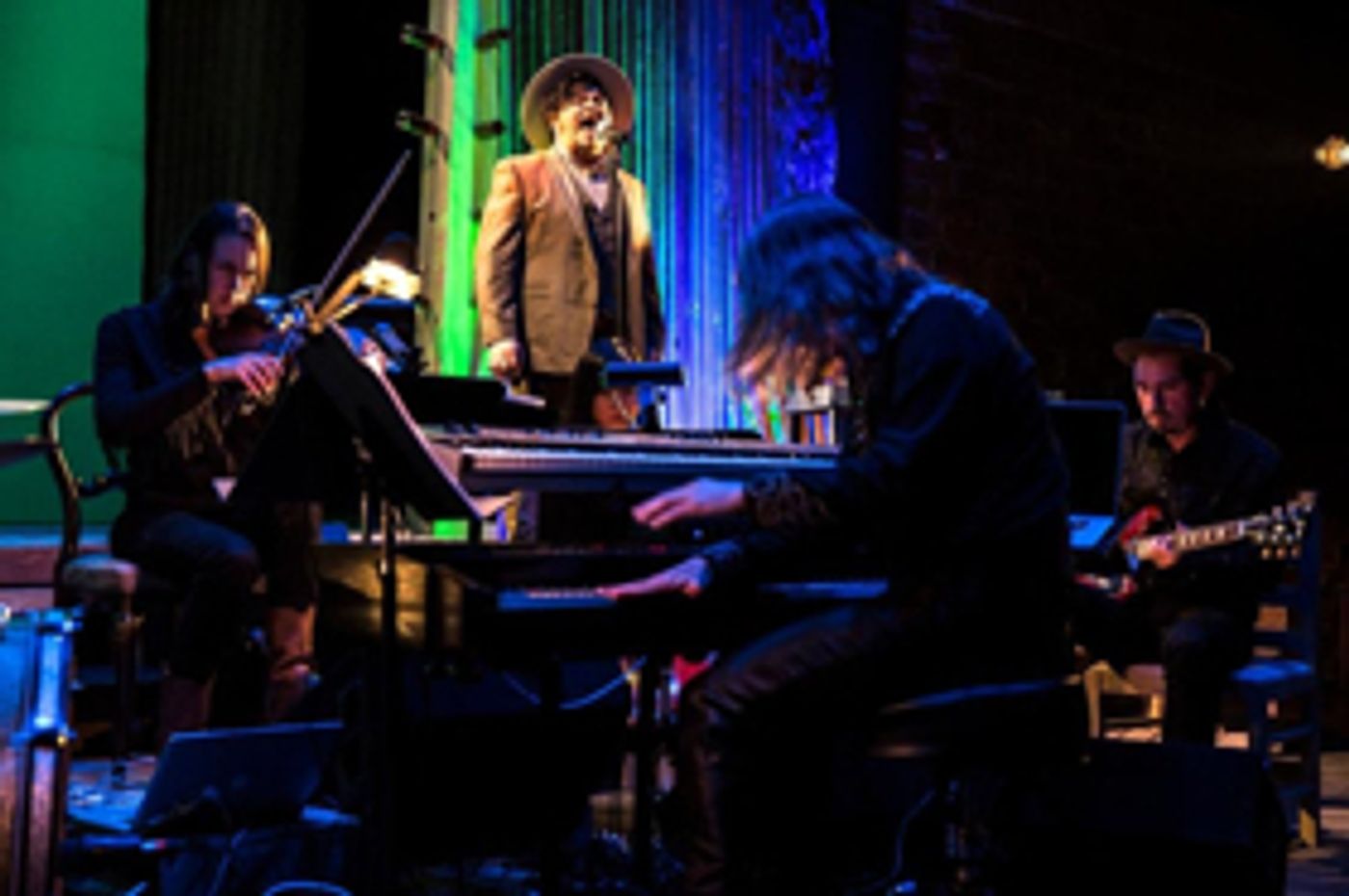
Showing at BRIC (647 Fulton Street in downtown Brooklyn), PANCHO VILLA FROM A SAFE DISTANCE is by composer Graham Reynolds, librettists Lagartijas Tiradas al Sol of Mexico City, director Shawn Sides of Rude Mechs, featuring an ensemble of two vocalists and six instrumentalists built around Grammy-winning producer-guitarist Adrian Quesada.
It's an experimental chamber opera about the life and death of Pancho Villa--an examination of the Mexican and Mexican-American impact on the culture and politics of West Texas, contributing to the current and timely conversation about borders. It was originally commissioned by Ballroom Marfa and co-commissioned by Fusebox Festival in Austin, where Morrison came across it and fell in love with it.
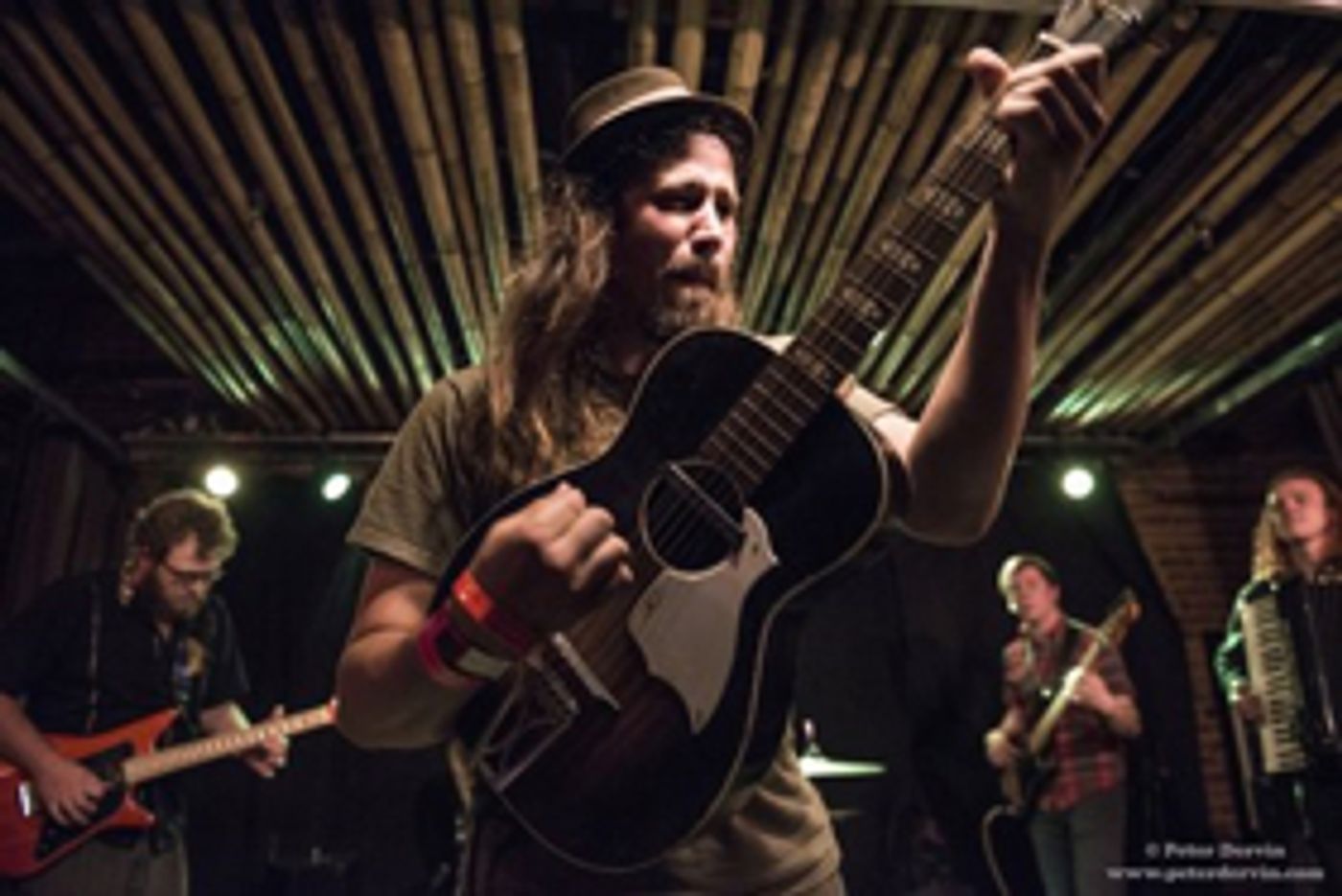
guitar. Photo: Peter Dervin
The other Kickstarter is THE INFINITE HOTEL, a live film and rock show to unify humans, written and directed by Michael Joseph McQuilken with music and lyrics by Firehorse & The Few Moments, co-presented with Irondale in downtown Brooklyn, 85 So. Oxford Street.
It invites live audiences to become 'extras' and step inside an elaborate movie-making machine, producing a one-take feature film together every night. The film's narrative follows five strangers unknowingly writing music together across space and time, and questions the nature of human interrelatedness, our appetite for visibility, and the creative ideas we accidentally share.
MILA and STINNEY
The festival originally announced a pair of projects still in progress ... "not ready for prime time"--or critics--but, to show you how fluid things are at PROTOTYPE, one of them has been "bumped up" because the production elements advanced more quickly than expected.
That one's MILA, GREAT SORCERER--about the folk hero, singer, and spiritual teacher, Milarepa, who has been venerated for one thousand years. It will be seen at the Gerald Lynch Theatre at John Jay College on two matinees, January 12-13. Set to lush orchestration by composer Andrea Clearfield, melding Eastern and Western sounds, it has a libretto by Jean-Claude van Itallie (a figure in NY avant-garde theatre since the '60s) and Lois Walden, and directed by Kevin Newbury.
As a child, Milarepa wields black magic against the aunt and uncle that stole his inheritance, and destroys his entire village. His remorse sends him on a life journey, including his transformation and redemption into the most revered teacher of Tibetan Buddhism.
The piece that remains a work in progress is STINNEY: AN AMERICAN EXECUTION, by composer-librettist Frances Pollock and co-librettist Tia Price, being done at the French Institute Alliance Française (FIAF) on East 60th Street in Manhattan. The opera has roots in gospel, blues, Baptist hymn, Appalachian folk music, and electronic techniques, and tells of George Junius Stinney Jr., the youngest person (age 14) legally executed in 20th century America, though he was wrongly accused and convicted of brutal murders, in 1944.
OF TIME AND PLACE
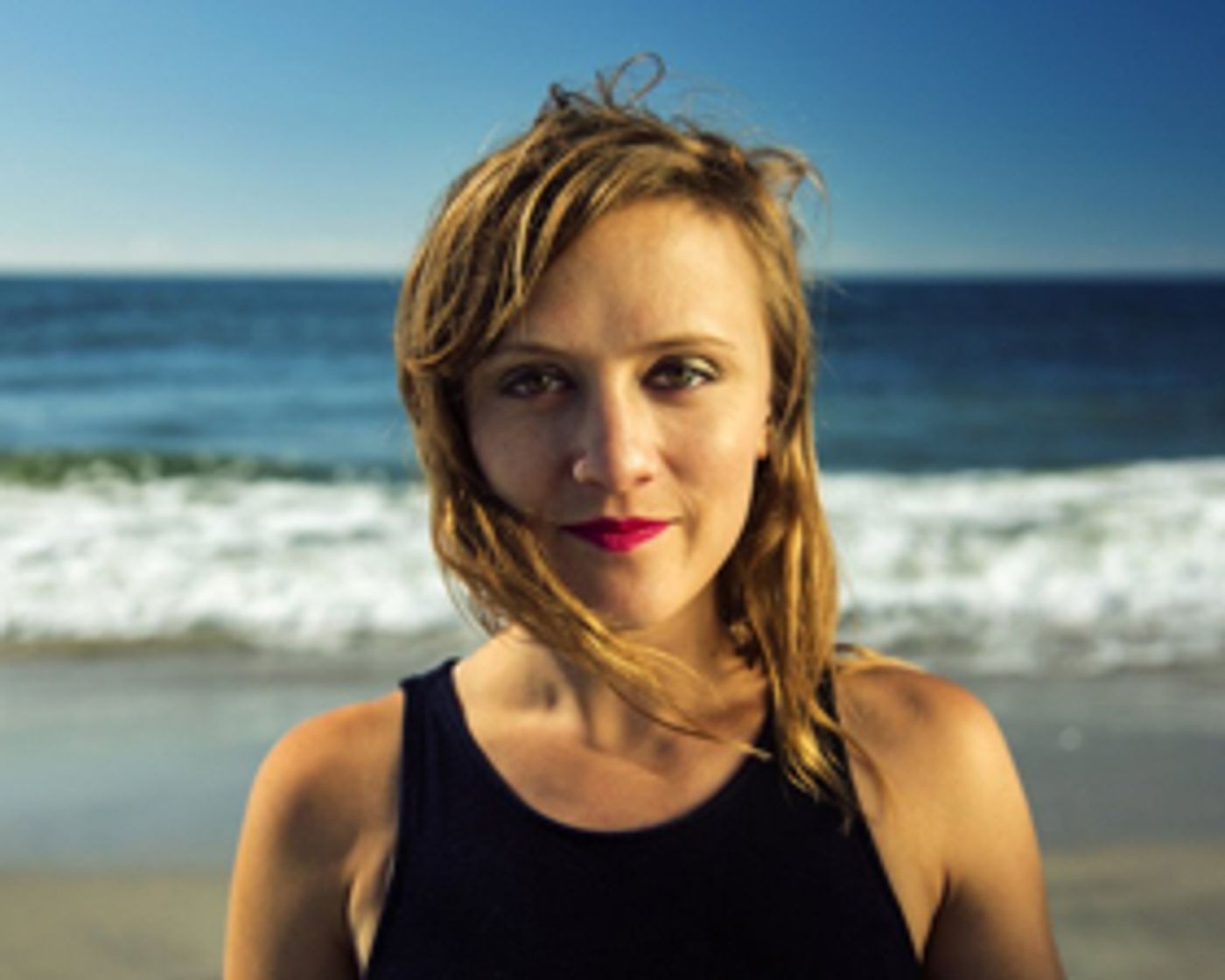
Ellen Reid--composer of PRISM--pops up again in one of a pair of commissions from Trinity Wall Street under the collective title OF TIME AND PLACE, alongside David T. Little and Royce Vavrek, who wrote the powerful DOG DAYS, a centerpiece of PROTOTYPE in 2015.
Both these premieres--Reid's East Coast premiere, DREAMS OF THE NEW WORLD, with libretto by Sarah LaBrie, and AM I BORN by Little with Vavrek's libretto--using oratorio to explore within the vernacular of specific times and places what has been lost for the sake of progress.
NEW WORLD, which originally premiered by co-commissioner LA Master Chorale in Los Angeles, portrays little-known, interview-based stories about the pursuit of the American dream in Memphis (1890), Houston (1970), and Los Angeles (2018). AM I BORN, which premiered in Brooklyn in 2012 and receives its world premiere on the Festival in an SATB (soprano, alto, tenor, bass) version, explores lost histories, altered places, and the spiritual bleed at the intersection of modernity and antiquity.
The works are being performed by The Choir of Trinity Wall Street and NOVUS NY, with Wachner conducting the performances at St. Paul's Chapel, 209 Broadway in downtown Manhattan.
THIS TREE and THE LITTLE DEATH: VOL. 1
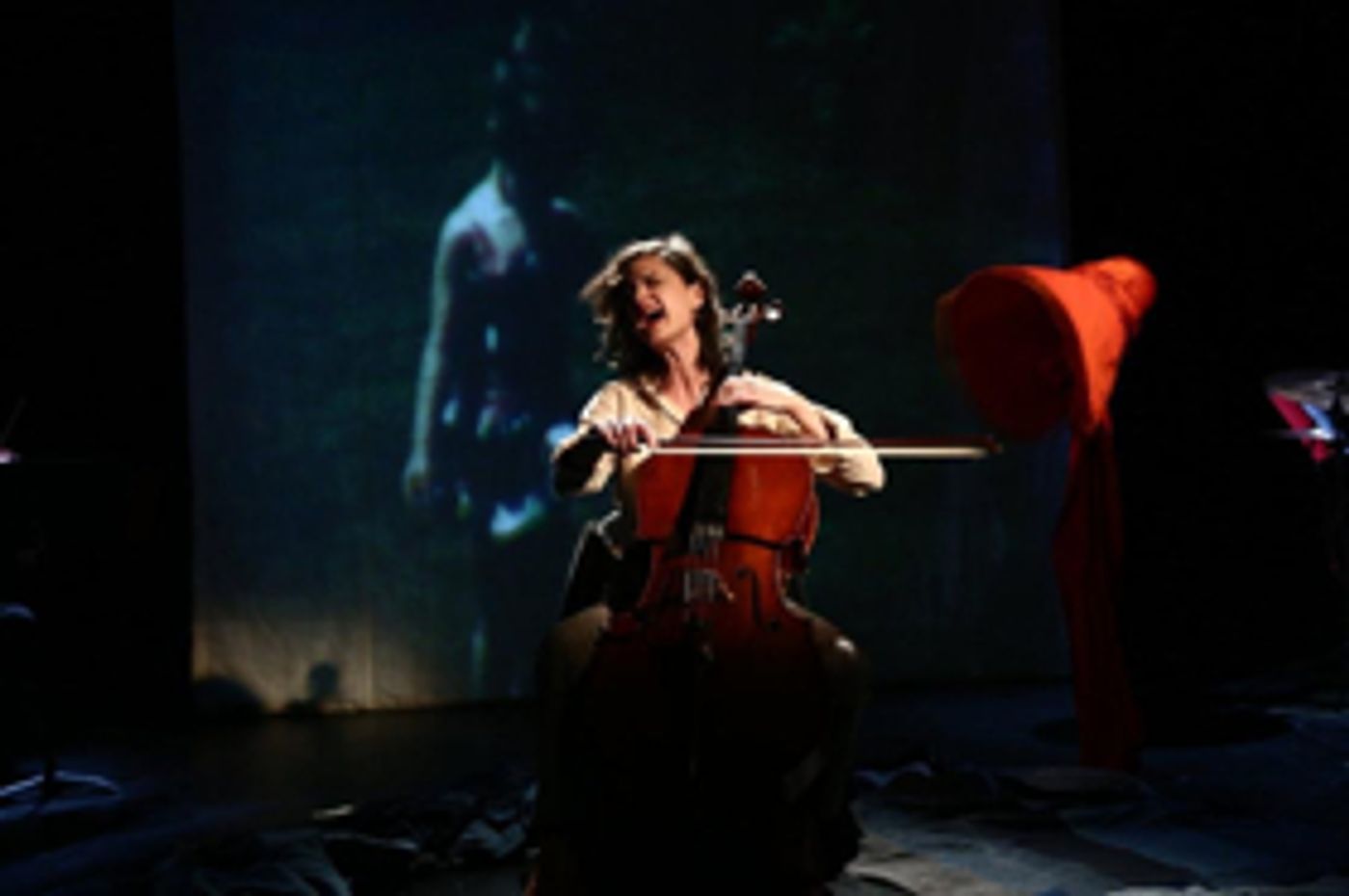
Photo: Paula Court
Leah Coloff's THIS TREE, which is more a music theatre piece, according to producer Marting, has been in development for more than two years; it was always intended for PROTOTYPE, says Marting, but the question was when it would be ready. Now is the time for the piece, a co-production of HERE and BMP, though produced for PROTOTYPE by HERE on its Mainstage in SoHo in Manhattan, 145 6th Avenue, entry on Dominick St.
THIS TREE weaves autobiographical storytelling, 8mm home movies, and cellist/singer Coloff's signature blend of blues, rock and non-traditional cello playing, supported by an all-female band, investigates the vantage point of being the last branch on the family tree. She traces the secrets of her family history, Coloff glides between idyllic childhood memories, unanswered questions and her roller coaster ride of fertility treatments.
Last but not least, there is THE LITTLE DEATH: VOL. 1. In May 2018, the contemporary music community of New York City lost one of its shining stars, composer Matt Marks, who wrote MATA HARI (with librettist and director Paul Peers) for PROTOTYPE 2017.
PROTOTYPE pays tribute to Marks by showcasing his first music-theatre composition, THE LITTLE DEATH: VOL. 1, in which he originated the male lead. The piece fuses bombastic electro-pop hooks, frenetically chopped break beats, hypnotic lyrics, and apocalyptic Christian imagery. It stars Ted Hearne and Mellissa Hughes and will be performed at Roulette, 509 Atlantic Avenue in Brooklyn, on the corner of Third Avenue.
I had one last question for the producers: What do you want the audiences to remember about the festival?
Says Marting: "I want them to think about how music is a thing that can touch parts of you--theatre touches you, dance touches you, all the art forms touch you. I think that music in a theatrical context has the potential to touch you in a bunch of different levels at the same time. And to have you examine deeply the issues that the artists were interested in.
"And I'd like them to be turning those issues over in their minds and be excited about the art form and how inventive it is right now. And how lucky we are to be in this time. And to be with artists of the capability and sophistication in their hands."
Morrison adds that PROTOTYPE is showcasing a spectrum of what opera--and other kinds of music--is today.
"What I want people to take away is that this word 'opera' is not a word that's meant to be housed in a 4000-seat theatre. I love the Met and I love going there and seeing that level of spectacle, which nobody else can produce and which is such an essential part of what this industry is."
She explains, "But it's not the only thing and what I want people to take away from the festival is that you can have intimate, visceral experiences with this art form that will touch you in ways that are different from being in a 4000-seat space and that some theatre is much broader than just one aesthetic and the artists working today are vibrant and this art form is anything but dying.
For more information about the offerings at PROTOTYPE, including tickets and venues, please see their website.
Videos
